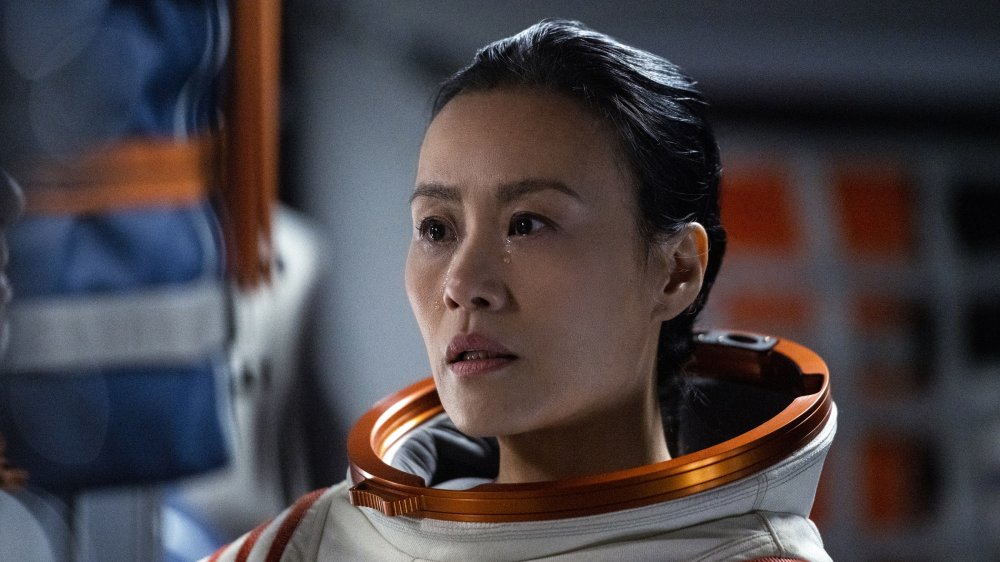The Real Reason Netflix's Away Just Got Canceled
The crew of the Atlas may have successfully landed on Mars, but it looks like we won't be following the rest of their journey. After just one season, Netflix has decided to pull the plug on its Hilary Swank-starring space drama Away. The short-lived series followed the first human expedition to the Red Planet, with a heavy focus not just on their years-long mission, but also the families and lives they left behind on earth. At the end of the first season, the crew reached Mars and was presumably preparing to begin the next phase of their mission. Alas, we won't be getting to see exactly what that would have entailed.
Deadline broke the news of the cancelation on October 19. While Away wasn't a culture-shifting phenomenon like other Netflix series such as Stranger Things or Orange Is the New Black, it certainly wasn't unpopular. Furthermore, the series' emotional final moments were a perfect launchpad for a second season that had plenty of room to improve and expand on its first. So, why then did Netflix decide to cut this mission short?
At the time of writing, the streamer hadn't released the specifics of why they decided to abandon this mission, but there are a few things we know that could point to the real reason why Away got canceled after just one season.
Away appeared to be doing fairly well with viewers ...
This article would be much shorter if season 1 of Away was a total flop, but that's far from the case. By Netlix's own metrics, the show was a hit when it dropped in September. It charted on the streamer's list of the Top Ten Most Viewed TV shows on their platform, even peaking in the number one spot (via Business Insider). Not only that, but according to The Hollywood Reporter, ratings calculator Nielsen reported that in its first few weeks of release, Away was the third most-watched series among their viewers on Netflix (Cobra Kai and Lucifer being the top two). They even calculated that Nielsen watchers in the US streamed over 2.7 billion minutes of Away.
The series was also far from a critical disaster. While Away got lukewarm reviews from some, the series wasn't panned in a way that might cause a distributor to pull the plug prematurely. If anything, the show only had room to grow. After all, the first season of Netflix's BoJack Horseman didn't receive the kind of near-universal praise that the seasons that came after did.
They may seem like everything, but commercial and critical success are only two factors in choosing whether or not a show will get another season. Another very important consideration is how much said show costs to produce. That factor may hold the key to Netflix's decision.
... but likely not well enough to justify the production costs
Netflix hasn't opened up about exactly how much the budget for season 1 of Away was. However, you don't need to be an expert in TV production to know that the series wasn't made on the cheap. After all, the series stars a two-time Oscar winner in Swank and a TV veteran with multiple Emmy-nominations under his belt in Josh Charles. Netflix likely spent some money attracting Swank and Charles to headline the project, and even beyond its stars, it's not hard to imagine that quite a bit of money was dropped on this space epic.
While some of the action of Away takes place on earth, much of the series is set in space. Between the intricate sets, the fact that the actors spend quite a bit of time simulating living in an anti-gravity environment, and the numerous set pieces that take place in the computer-generated depths of space, production costs were likely fairly high.
If the show did have a large budget, that likely means the bar for success was substantially higher than it might have otherwise been, all other factors being equal. Even though Away was a success in its first season by viewership, it's possible that it still wasn't enough to offset the large cost of its production.
There is one more important factor that may have played into the decision, and it's one that has already caused the premature demise of several other Netflix originals this year.
Did COVID-19 play a role in Away's cancelation?
The big elephant in the room is COVID-19, which has wreaked havoc on the film and TV industry. Productions were shut down mid-shooting, delayed indefinitely, or outright canceled due to the difficulties of figuring out how to safely film during a global pandemic. Netflix itself has already canceled multiple shows due to the disruptions. These include series like The Society, which Netflix had previously renewed (via Deadline), and GLOW, which was at the beginning of filming its fourth and final season before production was halted and the plug was pulled.
At this moment in time, the pandemic isn't being cited as the reason for Away's cancelation. However, the pressure it's putting on every sector of the entertainment industry very likely contributed to Netflix's decision. We might not know exactly why Netflix decided to ground the Joint Mars Initiative, but it seems very likely that the show wasn't as successful as the streamer needed it to be compared to its budget. Combine that with the COVID-19 of it all, and you've created the perfect conditions for an aborted mission.



